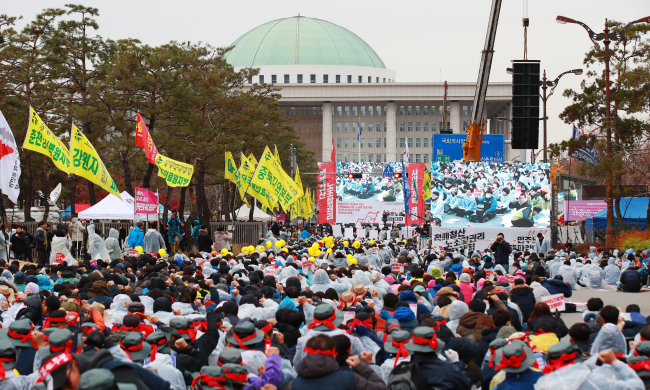Korea’s major labor umbrella union staged a walkout Wednesday to protest the government plan to expand the implementation of flexible work-hour system.
About 160,000 members of the Korean Confederation of Trade Unions, or about 18 percent of its 900,000 members, participated in the walkout for at least four hours to express their objection to the system, which they claim will worsen the working conditions for laborers.
 |
(Yonhap) |
The flexible work-hours system allows employees to work for any hours in one day as long as the total labor hours do not exceed the legal limit of 52 hours per week, within a two-week or three-month period.
For instance, if an employee worked 58 hours in one week, he can work 46 hours in following week and will not have exceeded the maximum working hours for that two-week period. It is implemented for companies that meets certain conditions, such as those whose workload varies seasonally.
Rival parties recently agreed to revise the law to expand the time period -- two weeks or three months -- to six months or one year, as complaints from the business sector mounted.
The KCTU opposes the plan, claiming that such extension will reinforce the institutionalization of long working hours and that it will ultimately lead to a reduction in pay as well.
In addition to the walkout, the labor union held rallies in 14 regions across the nation on Wednesday. About 30,000 members gathered at a rally in front of the National Assembly in Yeouido, according to the rally organizers. They also addressed other labor issues and demanded more government efforts to turn temporary workers to regular workers.
“Expanding the flexible work-hour system is the same as legalizing long work-hours. The intensity of work will go up and deaths from overwork will become common,” Kim Myung-hwan, the head of KTCU, said in the Seoul rally.
Korean Metal Workers’ Union, where many of its members are regular workers and members of hardline labor groups from big corporates, such as Hyundai Motor, took the lead in Wednesday’s protest.
Issuing an analysis report, the KTCU claimed the flexible hour system allows companies to make employees work a maximum of 80 hours per week, when work hours permitted for weekends are included. As companies will not have to pay for overtime work, it will also cut the average wage by up to 7 percent, the labor group said in the report.
The legal standard for death caused by overworking is working more than 60 hours per week, according to the Welfare Ministry.
The ruling Democratic Party of Korea expressed disappointment over the walkout, pointing at the timing of their decision to go on strike.
“I regret that the labor union chose to launch a protest instead of resolving the differences via discussion. I want them to think how holding the rally outside will help resolve the problem,” Rep. Hong Young-pyo said.
Wednesday’s walkout came just a day before the launch of a negotiating commission of labor and management planned for Thursday.
Liberty Korea Party Rep. Kim Hak-yong, chairman of Environment and Labor Committee at the National Assembly, also condemned the labor union’s strike, saying the group is a privileged class itself.
“The labor union, which has only about 4 percent of the entire employees in the country as members, is launching strikes saying they represent all laborers,” Rep. Kim said.
KTCU said it will hold another nationwide general rally nation on Dec. 1 to increase the pressure on the government.
By Jo He-rim (
herim@heraldcorp.com)





![[KH Explains] For Korean automakers, Chinese EVs may loom larger than Trump’s tariffs](http://res.heraldm.com/phpwas/restmb_idxmake.php?idx=644&simg=/content/image/2024/11/14/20241114050537_0.jpg)
![[Graphic News] Tainan predicted top destination for South Koreans in 2025](http://res.heraldm.com/phpwas/restmb_idxmake.php?idx=644&simg=/content/image/2024/11/13/20241113050807_0.gif)

![[Herald Review] Cho Seung-woo takes 'Hamlet' crown](http://res.heraldm.com/phpwas/restmb_idxmake.php?idx=644&simg=/content/image/2024/11/14/20241114050593_0.jpg)